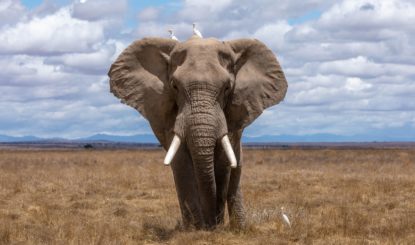The EU restricts its domestic ivory trade: finally a step forward for African elephants!
On December 16, the European Commission adopted a new set of rules on the internal trade of ivory, restricting the possibilities to buy and sell ivory within its territory. Fondation Franz Weber (FFW) welcomes this step forward for the protection of African elephants, victims of poaching and trade in their tusks. However, the organisation would have preferred more fortitude from the European Union (EU).
Any trade in ivory, whether legal or illegal, directly threatens the survival of African elephants. Elephants are being decimated across the continent for their ivory, which often ends up laundered in domestic markets in Asia, Japan, and the EU, despite a ban on international ivory trade under the Convention on International Trade in Endangered Species of Wild Fauna and Flora (CITES). For years, FFW has advocated the complete closure of domestic ivory markets, and has obtained clear recommendations from CITES in this regard.
After several years, the EU has finally taken steps to align itself with CITES decisions and restrict its domestic ivory market. In particular, FFW welcomes the European Commission’s decision to suspend the trade in raw ivory on the EU market, other than for repairs to pre-1975 musical instruments and pre-1947 antiques of high cultural, artistic or historical importance. However, there are still concerns about certain exceptions in EU legislation. In particular, the commercial trade in solid, pre-1947 worked ivory will continue, subject to authorisations. These exceptions send mixed messages to poachers in Africa and elsewhere, who will continue to believe that ivory has value in the EU, and will therefore continue their activities.
Furthermore, many of the measures decided by the EU are in the form of guidance, which will have to be implemented by the member States. Vera Weber, President of FFW, fears that this will not be enough: “A straightforward ban on the ivory trade would have been clearer and more effective in combating the drastic decline of elephant populations in Africa,” she explains. “At the very least, it is essential that the EU and its Member States carefully monitor the implementation of the measures decided by the European Commission, and in particular those included in the guidance, and, above all, that the Commission monitors the progress made and reports regularly to Parliament on progress.”


